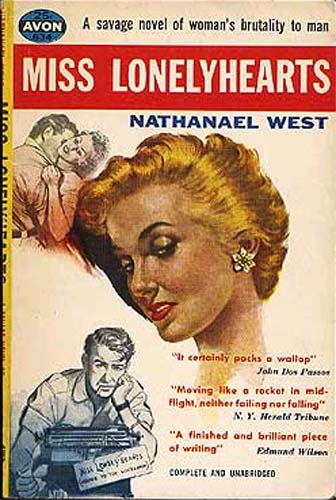
An extensive (and we do mean extensive) search of databases of newspapers, magazines and other sources turned up what may be the first ironic reference to "Kumbaya" in print, from Aug. 16, 1985. The line is from a Washington Post review by Rita Kempley of the comedy movie Volunteers: "Tom Hanks and John Candy make war on the Peace Corps in Volunteers, a belated lampoon of '60s altruism and the idealistic young Kumbayahoos who went off to save the Third World." How did she settle on "Kumbaya?" Had she heard others mocking it? Was it something about the cynicism felt by liberals under Reagan? A commentary about the religious theme of the song, at a time when the Moral Majority was making its name? Ms. Kempley can't remember. "I guess that song was the ultimate expression of people in the '60s who really cared," said Ms. Kemply (who accepted a buyout last year from the Post). "And then everyone decided, Let's just make fun of that."
Dear Miss Lonelyhearts: How did 'Kumbaya' become a mocking metaphor?
How did 'Kumbaya' become a mocking metaphor?
02:40 PM CST on Sunday, November 12, 2006
By JEFFREY WEISS / The Dallas Morning News
What do a recent Republican political ad, bubble gum commercial and British newspaper spoof of a soccer rivalry have in common?
All make fun of a well-known religious song. The GOP ad is typical: An impersonator of former Secretary of State Madeleine Albright sings "Kumbaya" with terrorists. Why is "Kumbaya" the designated silly-song to represent phony or ineffectual friendliness?
Where did the song come from? And what the heck is a "Kumbaya," anyway?
Also Online
Religion blog: Check out various performances and discussions of "Kumbaya."
The last question is the easiest to answer: "Kumbaya" is a pidgin version of "Come by here." The word repeats as a prayer throughout the song. A typical verse runs:
Someone's praying, Lord. Kumbaya./ Someone's praying, Lord. Kumbaya./ Someone's praying, Lord. Kumbaya./Oh, Lord, Kumbaya.
In other verses, someone's singing, crying, sleeping and so on.
The song's roots wind from South Carolina to Oregon to Angola to Ohio – and out to nearly every summer camp in America.
Wikipedia, the online encyclopedia, offers an oft-repeated theory about the creation of "Kumbaya." It says the song (also spelled "Kum Ba Yah") was composed by the Rev. Marvin V. Frey (1918-1992) in the 1930s in New York City.
While it's commonly thought to be a "19th-century African-American folksong, originating among the Gullah, a group descended from enslaved Africans living on the Sea Islands of South Carolina and Georgia ... there is no evidence of the song before Frey's publication," Wikipedia says.
Concise, simple – and significantly wrong. (Lesson: The Wiki is handy, but not trustworthy.)
What may be the best chronicle of "Kumbaya" has been written by Lum Chee-Hoo, a doctoral student in music education at the University of Washington. His article is to be published in Kodaly Envoy, a scholarly music journal.
"I was interviewing some undergrads on camp songs they know and found out that 'Kumbaya' was top of the list, and so decided to do a little investigation," he said.
Here's what Mr. Lum found:
The earliest known threads of "Kumbaya" history are in Washington, D.C., at the American Folklife Center of the Library of Congress.
Sometime between 1922 and 1931, members of an organization called the Society for the Preservation of Spirituals collected a song from the South Carolina coast. "Come By Yuh," as they called it, was sung in Gullah, the Creole dialect spoken by the former slaves living on the Sea Islands.
Another version was preserved on a wax cylinder in May 1936 by Robert Winslow Gordon, founder of what became the American Folklife Center. Mr. Gordon discovered a woman named Ethel Best singing "Come By Here" with a group in Raiford, Fla.
The music and lyrics in both cases were similar, though not identical, to the modern version.
So how could Mr. Frey, a pastor and composer, claim authorship? According to Mr. Lum, Mr. Frey said that he had been inspired by a prayer he heard delivered by "Mother Duffin," a storefront evangelist in Portland, Ore.
Mr. Frey's first lines: "Come by here. Somebody needs salvation, Lord. Come by here." A lyric sheet of Mr. Frey's final version, printed in 1939, indicates it was written in 1936 – well after the versions collected by the music historians.
So was Mr. Frey inspired by a woman praying by using a song she had learned on the other side of the continent? Or was he one of many white artists of his era who piggybacked on the creativity of African-Americans without giving credit? The history is silent.
Mr. Frey went to his grave claiming the song was his own. In any case, by the early 1940s, Mr. Frey's copyrighted version had made it into church hymnals and onto live radio broadcasts.
Next, according to Mr. Frey, he taught the song to missionaries headed for Africa. By the late 1940s, other missionaries had returned to America from Africa singing "Kum By Yah" – with no idea where it had originated.
Jump forward to the mid-1950s and the Cooperative Recreation Service, an Ohio-based publisher of songbooks for camps and scouts.
Joe Hickerson, a folksinger and former director of acquisitions for the American Folklife Center, credits Lynn Rohrbough, the owner of Cooperative Recreation, with getting "Kumbaya" to the masses.
If a camp wanted a music book with, say, 40 songs, Ms. Rohrbough would offer 30 from her stock inventory and add 10 new ones, Mr. Hickerson said.
"Kum By Yah" – described only as an "African" song – was part of the Rohrbough inventory by 1956. As a result, it showed up in countless books of camp songs used by the Girl Scouts, Boy Scouts and others.
"The camp counselors who played guitar liked it because it only has three chords," Mr. Hickerson said.
In the 1950s, he was a student at Oberlin College, in Ohio, where he and some friends had formed a singing group, the Folksmiths. He said he first heard "Kumbaya" in 1957 from a folksinger named Tony Saletan, who had learned it from Ms. Rohrbough.
That summer, the Folksmiths played the song for thousands of campers, Mr. Hickerson said. When the group released an album in 1958, "Kumbaya" was included – the first commercial recording of the song.
Pete Seeger also recorded the song on an album released that year. Many other folksingers quickly followed suit, including the Weavers, Joan Baez, and Peter, Paul and Mary.
In time, the song spread beyond summer camps to become a mainstay of the civil rights movement and Catholic folk masses. So "Kumbaya," apparently, traveled from the Atlantic coast to the Pacific Northwest, to central Africa and back, from a Midwest publishing house to campgrounds everywhere, and, finally, into the broad vernacular of American folkmusic.
For the next 25 years, it was just one folksong among many.
But in the early 1980s, something happened. "Kumbaya" became the English-speaking world's favorite folksong to ridicule, the musical metaphor for corny camaraderie. How? Someone's wondering, Lord.
An extensive (and we do mean extensive) search of databases of newspapers, magazines and other sources turned up what may be the first ironic reference to "Kumbaya" in print, from Aug. 16, 1985.
The line is from a Washington Post review by Rita Kempley of the comedy movie Volunteers:
"Tom Hanks and John Candy make war on the Peace Corps in Volunteers, a belated lampoon of '60s altruism and the idealistic young Kumbayahoos who went off to save the Third World."
How did she settle on "Kumbaya?" Had she heard others mocking it? Was it something about the cynicism felt by liberals under Reagan? A commentary about the religious theme of the song, at a time when the Moral Majority was making its name?
Ms. Kempley can't remember. "I guess that song was the ultimate expression of people in the '60s who really cared," said Ms. Kemply (who accepted a buyout last year from the Post).
"And then everyone decided, Let's just make fun of that."
Dissing "Kumbaya" caught on.
In 1988, a column in The Christian Science Monitor knocked a New Age performance: "Next he'll want you to sing 'Kumbaya.'..." Time to leave."
In 1994, then-senatorial-candidate Rick Santorum dismissed the federal AmeriCorps program as "somebody ... going to do one year of community service picking up trash in a park and singing 'Kumbaya' around the campfire."
These days, a search for "Kumbaya" on Google or YouTube is almost as likely to turn up a joke as the song.
The recent bubble gum TV ad shows a bunch of tween-aged "summer campers" around a campfire.
"Let's sing 'Kumbaya,' " a rainbow-clad "camp counselor" says.
"We don't want no 'Kumbaya!' the kids yell. "All we want is bubble gum!"
Which doesn't make a ton of sense. But neither does the decision to make "Kumbaya" the symbol of insincere bonhomie. After all, the lyrics have nothing to do with friendship or unity.
So why did "Kumbaya" – among all the folksongs written in the last 100 years – become an idiom for idiocy?
Here's a partial list of etymologists, linguists and other experts who say they don't know:
Paul Heacock, editor of the Cambridge Dictionary of American Idioms ... Erin McKean, editor in chief of U.S. dictionaries for Oxford University Press ... Cynthia Barnhart, senior general editor for the Third Barnhart Dictionary of New English ... Grant Barrett, editor of The Official Dictionary of Unofficial English ... Wayne Glowka, an editor at the journal American Speech and chair of the American Dialect Society's committee on new words ... Barry Popik, contributor to the Historical Dictionary of American Slang ... Hugh Rawson, author of Rawson's Dictionary of Euphemisms and Other Doubletalk.
Some guesses: It's a one-word title that rolls easily off the tongue. It sounds foreign, and that makes it funny to many Americans. It's African-American, so racists deride it. It's African-American, so sappy white liberals couldn't wait to suck the soul out of it. It's a song that generations of summer campers (and folk-mass celebrants) were forced to sing, and they're sick of it.
Since nobody really knows, let's give the final word to Pete Seeger, from his liner notes to the 1958 album Pete Seeger and Sonny Terry at Carnegie Hall:
"At any rate, it is a beautiful example of how the world's folkmusic continues to intermingle, sans passports or permission, across boundary lines of fear and prejudice."
Kumbaya.
E-mail jweiss@dallasnews.com


















